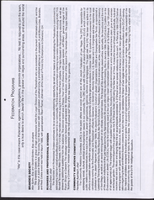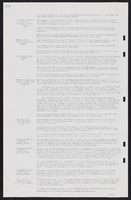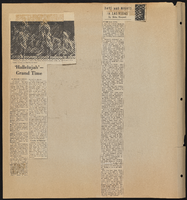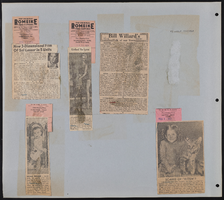Search the Special Collections and Archives Portal
Search Results
Lamar and Patricia Marchese Papers
Identifier
Abstract
The Lamar and Patricia Marchese papers (1959-2015) contain awards, correspondence (both professional and personal), a Clark County Services and Facilities Directory, newspaper and magazine clippings, pamphlets, Parks and Recreation information, KNPR events and newsletters, art exhibits brochures, and musical performances brochures. The collection chronicles the contributions of the long-time Las Vegas community leaders through photographs, speeches, an interview done with Lamar Marchese, professional papers, audiovisual materials, Las Vegas Centennial Board (LVCB) end of year report, and a LVCB book.
Archival Collection

Transcript of interview with Alfred "Al" Guzman by Barbara Guzman, March 1, 1981
Date
Archival Collection
Description
On March 1, 1981, Barbara Guzman interviewed her father, Alfred “Al” Guzman (born 1932 in El Paso, Texas) about his life in Southern Nevada. Guzman first talks about his occupational history, including his then-current career in public relations for the Sands Hotel and Casino. He then talks about Las Vegas, including social changes, changes in the gaming industry, and mob influence in the casinos. He also talks about Reno, how his job affects the public, and the MX Missile system.
Text

Transcript of interview with Michael Tell by Barbara Tabach, January 6, 2018
Date
Archival Collection
Description
Michael Tell, the youngest son of Jack and Beatrice Tell, is the publisher of the Las Vegas Israelite newspaper and the second generation of ownership. He briefly traces his Jewish ancestral roots back to Eastern European grandparents who settled in New Jersey and New York. He became a bar mitzvah in a conservative Jewish synagogue in New York City. At age sixteen, he accompanied his father, Jack Tell, westward to Nevada. The elder Tell was in pursuit of owning a newspaper and Mike was a perfect companion as Jack took over ownership of the Territorial Enterprise. Mike recalls it was a short lived venture and the family settled in Las Vegas, where his father went to work for Hank Greenspun at the Las Vegas Sun and then for Henderson Home News, owned by Morry Zenoff. In 1965, Jack Tell opened the Las Vegas Israelite. Meanwhile, Mike explored the lucrative business of concert promotions and opened a teen nightclub 1961 called the Twin Lakes Twist. He hired such talents of the era as Bobby Darin and Wayne Newton. Soon his business acumen grew and he moved Mike Tell Productions to Los Angeles. He tells the story of his last concert, booking Al Green, and being held at gunpoint. Then in 1979, he returned to work at the Israelite, which had a circulation of about 2000. The Jewish community was beginning to show signs of growth. He recalls running an ad in 1992 for High Holy Days services to be held at the Aladdin hotel. He used the word “Lubavitvh” in the ad and this sparked an interest in Las Vegas from the Chabad movement. He also recalls anti-Semitic episodes in Las Vegas, such as Ralph Englestad’s Hitler birthday parties and the presence of Skinheads. And he reflects on the changes in the community that he has observed over the decades.
Text


Transcript of interview with Roger Pettersson by David G. Schwartz, February 24, 2017
Date
Archival Collection
Description
Text
Richard and Sheilagh Brooks Papers
Identifier
Abstract
The Richard and Sheilagh Brooks Papers (1919-2003) are comprised of materials collected during their tenure as professors of Anthropology and Archaeology at the University of Nevada, Las Vegas (UNLV). Included are correspondence, research papers, photographs, reports, books, article reviews, and student scholarship. There is also a file on reburial issues that contains correspondence and an amendment to Nevada State law regarding the handling of exhumed bodies.
Archival Collection




